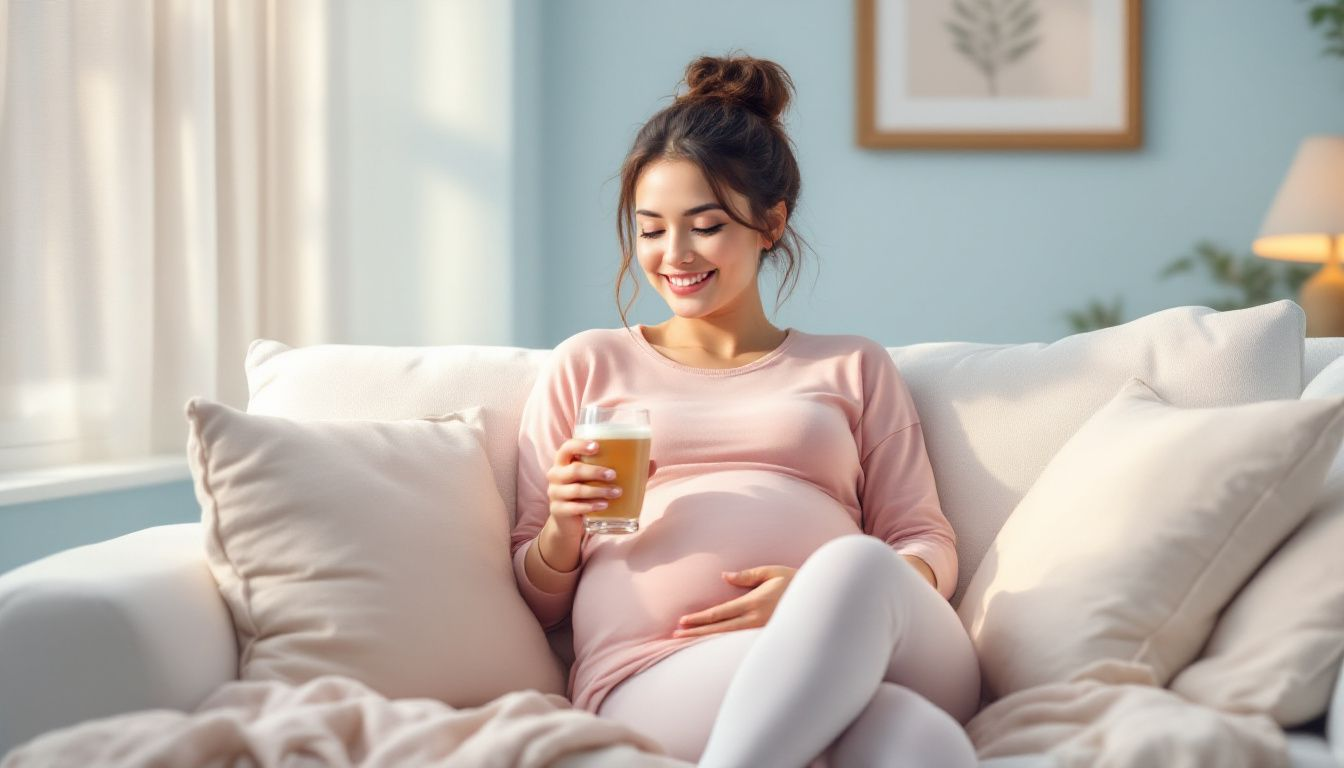
Non Alcoholic Beer During Pregnancy: What You Need to Know
Can you drink non-alcoholic beer while pregnant? This question concerns many expectant mothers. While non-alcoholic beers contain minimal amounts of alcohol, their safety during pregnancy is still a matter of discussion.
In this article, we explore expert opinions, examine the potential risks, and suggest alternatives to help you make an informed choice.
Key Takeaways
- Non-alcoholic beer, defined as having an ABV of 0.5% or less, may still contain trace amounts of alcohol that can pose risks during pregnancy.
- Health organizations advise complete alcohol abstinence during pregnancy, as no safe level of alcohol consumption has been established for fetal development.
- Experts recommend consulting healthcare providers before consuming any non-alcoholic beverages during pregnancy to ensure safety and avoid potential risks.

Understanding Non-Alcoholic Beer
Non-alcoholic beer qualifies as such when its alcohol by volume (ABV) is below 0.5%. This low alcohol content offers an alternative for those aiming to reduce or avoid alcohol consumption. So, how is non-alcoholic beer made?
Two main methods are used to produce non-alcoholic beer: preventing fermentation from generating alcohol or removing alcohol from regular beer. The first method alters the brewing process to limit yeast’s alcohol production.
The second involves techniques like distillation, filtration, or evaporation to extract alcohol. Both methods have unique advantages and challenges in preserving flavor and quality.
Advanced production methods include reverse osmosis, vacuum distillation, and the spinning cone method.
Reverse osmosis separates alcohol while keeping flavor compounds intact. Vacuum distillation preserves flavors by removing alcohol at lower temperatures. The spinning cone method extracts alcohol under reduced pressure, maintaining the beverage’s integrity.
Alcohol Consumption During Pregnancy
During pregnancy, alcohol consumption poses significant risks, as it can pass through the placenta and affect fetal development. Therefore, health organizations advise pregnant women to avoid alcohol completely.
Fetal Alcohol Spectrum Disorders (FASDs) result from maternal alcohol consumption during pregnancy and can cause lifelong challenges, including behavioral and learning difficulties.
The most severe form, Fetal Alcohol Syndrome (FAS), involves central nervous system issues and distinctive facial features. These conditions underscore the necessity of avoiding alcohol to protect the baby’s health.
No known safe amount of alcohol exists for consumption during pregnancy.
Both the American College of Obstetricians and Gynecologists (ACOG) and other health organizations stress that any alcohol intake is unsafe. Women are advised to abstain from alcohol both during pregnancy and when trying to conceive to protect fetal development.
Is It Safe to Drink Non-Alcoholic Beer While Pregnant?

Determining whether non-alcoholic beer is safe during pregnancy is complex. While non-alcoholic beers with an ABV of 0.5% or less are often deemed acceptable, similar to the alcohol content in fruit juice or bananas, even trace amounts of alcohol can raise concerns.
Non-alcoholic beers may contain higher levels of ethanol than their labels indicate, meaning they may not be as alcohol-free as they appear.
Critical evaluation of these beverages is necessary since even trace amounts of alcohol can pose risks during pregnancy.
With no definitive research confirming the safety of non-alcoholic beer during pregnancy, prioritizing the baby’s health is essential. Expectant mothers should carefully read labels and consult healthcare providers for personalized advice based on their medical history and health status.
Detectable Alcohol in Non-Alcoholic Beers
Detectable alcohol in non-alcoholic beers is a critical concern. Research shows these beverages can contain more alcohol than their labels indicate, posing potential risks, especially for pregnant women aiming to avoid alcohol exposure.
Drinking non alcoholic beer can lead to unintended consequences.
Some non-alcoholic beers have ethanol levels as high as 1.8%, despite being labeled as 0.0% ABV. This discrepancy highlights the importance of checking labels and recognizing their potential inaccuracies.
Non-alcoholic drinks can contain up to 0.5% ABV, considered non-alcohol-free by some standards.
These findings emphasize the need for caution when selecting non-alcoholic beverages during pregnancy.
Expectant mothers should opt for zero alcohol beverages with zero detectable alcohol and seek healthcare provider guidance.
Health Risks of Consuming Non-Alcoholic Beer During Pregnancy
To eliminate the risk of fetal alcohol spectrum disorder, abstinence from non-alcoholic beer is advised. No safe threshold for alcohol consumption during pregnancy exists, prompting experts to recommend total abstinence.
Trace alcohol in non-alcoholic beers can impact fetal development. Higher-than-indicated ethanol levels in these beers pose additional risks, potentially increasing the chance of fetal alcohol spectrum disorder.
Therefore, many experts advise against consuming non-alcoholic beverages during pregnancy.
Prioritizing the baby’s health and safety involves avoiding products with any alcohol content, even trace amounts, ensuring a healthy and alcohol-free pregnancy.
Expert Recommendations on Non-Alcoholic Beverages
Experts advise avoiding non-alcoholic beverages during pregnancy due to the risks from trace alcohol amounts. The CDC and ACOG both state no known safe alcohol level during pregnancy, reinforcing the need for caution.
Consulting health professionals before consuming non-alcoholic beverages during pregnancy is wise. Registered dietitians and obstetricians can offer valuable insights into the safety of these drinks.
To minimize risks, opting for drinks labeled ‘alcohol-free’ is advisable. The lack of definitive studies on the safety of non-alcoholic drinks during pregnancy raises concerns, supporting the need for professional guidance.
Alternative Alcohol-Free Drinks for Pregnant Women

Many alcohol-free drink options are safe for pregnant women. Popular choices include Alcohol-Free Mimosa, Alcohol-Free Lemon Lavender Martini, and Alcohol-Free Blueberry Basil Fizz, offering delightful alternatives to traditional alcoholic drinks.
Additional options include alcohol-free mocktails, herbal teas, infused water, and fruit juices. Refreshing choices like soda water with pineapple juice or lemonade, cranberry juice mixed with ginger ale, or half Sprite and half orange juice are also festive and enjoyable.
Homemade mocktails with natural ingredients ensure safety and can be customized to personal tastes. These alternatives offer various flavors for pregnant women to enjoy without alcohol-related risks.
How to Choose Safe Non-Alcoholic Drinks
Selecting safe non-alcoholic drinks during pregnancy requires careful consideration. Research shows that some beverages labeled low or no alcohol can exceed the stated alcohol content.
To ensure safety, choose non-alcoholic drinks with 0.0% ABV.
Always check the ABV content, ingredient list, and added sugars to ensure safety. Also, watch for excess caffeine, unpasteurized vinegar, or unusual botanicals in alcohol-free products.
When enjoying mocktails, avoid ingredients like high caffeine, CBD, and adaptogens.
Consulting a healthcare provider before trying new non-alcoholic beverages is a wise step. If in doubt about a drink’s safety, seeking advice from a doctor or dietitian ensures peace of mind.
The Role of Support Systems During Pregnancy
Support systems are crucial for helping pregnant women maintain sobriety and make healthy choices. Family and friends who abstain from alcohol can significantly assist in this effort, providing compassionate support to encourage abstinence.
Open communication about alcohol-free choices is vital for creating a supportive environment. Organizing alcohol-free social events and encouraging non-alcoholic alternatives help pregnant women feel included without compromising their health.
Support from other expectant mothers, online communities, and prenatal classes can be invaluable for maintaining sobriety. These systems offer a sense of community and shared experience, easing the challenges of pregnancy.
Breastfeeding and Non-Alcoholic Beer

Moderate consumption of non-alcoholic beer is generally not expected to harm infants during breastfeeding.
However, ethanol from non-alcoholic beer can be detected in breast milk, necessitating careful consideration. About 13% of non-alcoholic beer consumed transfers trace amounts of alcohol into breast milk.
To minimize infant alcohol exposure, mothers should briefly postpone breastfeeding after consuming non-alcoholic beer.
A two-hour delay per standard drink is recommended. However, the safest option for breastfeeding mothers is to avoid alcohol entirely.
Guidelines for Drinking Alcohol Post-Pregnancy
Once cleared by a healthcare provider, birthing parents can consider moderate alcohol consumption. The CDC recommends no more than one alcoholic drink at a time and waiting 2-3 hours before breastfeeding, ensuring alcohol is metabolized and minimized in breast milk.
According to CDC guidelines, moderate alcohol consumption while breastfeeding is not known to harm the baby.
However, factors like quantity, consumption rate, parent’s weight, and food intake affect how long alcohol stays in breast milk. Being mindful of these factors prevents potential risks.
Additionally, falling asleep under the influence of alcohol while caring for a baby increases the risk of suffocation or sudden infant death syndrome (SIDS).
Therefore, parents should avoid alcohol consumption when responsible for their baby’s safety and well-being.

Summary
In summary, while non-alcoholic beer offers a tempting alternative for pregnant women, it is essential to approach it with caution.
The presence of trace amounts of alcohol and inconsistent labeling can pose risks during pregnancy. Health experts and organizations strongly recommend abstaining from alcohol, including non-alcoholic beers, to ensure the safety and well-being of the baby.
For those seeking safe alternatives, a variety of alcohol-free drinks and mocktails can be enjoyed. Consulting healthcare providers and leveraging support systems can further aid in making informed choices.
Ultimately, prioritizing the health of both the mother and the baby is paramount, and making educated decisions about alcohol consumption is a crucial part of this journey.
Frequently Asked Questions
Can you drink non-alcoholic beer while pregnant?
It's generally advised to avoid non-alcoholic beer during pregnancy because it can contain trace amounts of alcohol. Always check with your healthcare provider to be safe.
Are there any safe non-alcoholic beverages for pregnant women?
Absolutely! Pregnant women can enjoy a variety of safe non-alcoholic options like alcohol-free mocktails, herbal teas, infused water, and fresh fruit juices.
How much alcohol is considered safe during pregnancy?
There's no safe amount of alcohol during pregnancy, so it's best to completely abstain to avoid any potential risks to your baby. Your health and the health of your little one are what truly matter!


